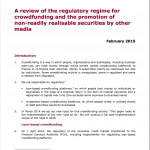By: Kim Wales (NY) — 02/03/2015
A review of the regulatory regime for crowdfunding and the promotion of non-readily realizable securities by other media were published today by the Financial Conduct Authority. One area focus was of focus is on mini-bonds, which is a type of debt security, typically issued by small businesses. “Such securities run for around three to five years, in general, and offer an interest rate of between 6% and 8% a year. Such businesses may have found it difficult to secure a loan from a bank or could be start-up companies looking for funding.”
However, a ‘warning label’ should come with the buy and sell of the mini-bonds, they are a way for companies to bypass the City and borrow money directly from private investors, and have been issued by firms ranging from John Lewis to Hotel Chocolat.
The FCA review says “it is important for prospective investors to understand the risks. Mini-bonds are illiquid and can be high risk, as the failure rate of small businesses is high. There is no protection from the Financial Services Compensation Scheme (FSCS) if the issuer fails. Firms promoting these securities to the public must make the risks clear to prospective investors.”
Sometimes the return can be really high if the investor elects to take their return in the form of goods or services. For example, upmarket coffee shop chain Taylor St Baristas, which launched its mini-bond in November 2014, gave investors the choice of an 8% cash return or 12% in the form of store credit, which would reportedly add up to about 30 coffees a year for an investment of £500.
Other well-known names that have launched mini-bonds include Hugh Fearnley-Whittingstall’s restaurant and food business, River Cottage, which was offering interest of 7% a year plus 10% off at its outlets, and retailer Hotel Chocolat, whose most recent bond let investors choose between an annual return of 7.25% in the form of in-store credit, or 7.33% in the form of a monthly box of chocolates.
Many of the bonds have been launched via Crowdcube, a crowdfunding websites, and successfully raised £1m in less than 36 hours for River Cottage.
Just days ago it was revealed that almost 1,000 small investors who put a total of £7.5m into mini-bonds known as “secured energy bonds” are unlikely to see a penny of their money back after it emerged the cash was siphoned off to an Australian company that later went bust.
The FCA said it had reviewed the promotions of a number of mini-bonds on crowdfunding platforms and via direct advertising, and had a number of concerns.
It added: “Firms are failing to make clear that mini-bonds are investments that place investors’ capital at risk, and are not deposit-based or capital-protected products.”
The regulator also said it was misleading to compare the interest rates on mini-bonds with those available from traditional savings accounts, where people’s money was not at risk.
The FCA added that while mini-bonds were sometimes put into the same category as retail bonds, which are another way of raising money from private investors, there were important differences. For example, while investors can usually buy and sell retail bonds, mini-bonds are generally not traded, so investors’ money is effectively locked in until maturity, as the mini-bond cannot be sold on before the end of its term. “This should be made clear to prospective investors,” said the FCA.




